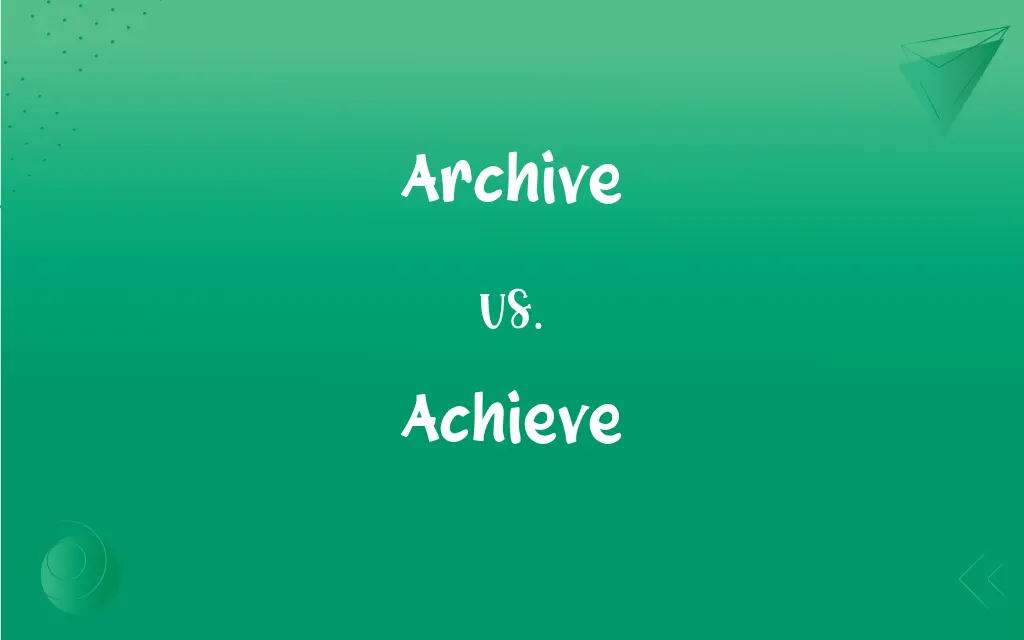Archive vs. Achieve: What's the Difference?
Edited by Aimie Carlson || By Harlon Moss || Updated on November 7, 2023
Archive is to store historical records or documents; achieve is to successfully reach a goal.

Key Differences
Archive, as a noun, refers to a collection of historical documents or records, particularly those that are officially filed or kept. When used as a verb, it means to place or store something in an archive. For example, an organization might archive its meeting minutes for future reference. This action is oriented towards preservation and long-term storage.
Achieve is a verb that signifies the accomplishment of a goal, task, or objective, often after considerable effort. When someone achieves something, it is generally understood that they have reached a significant milestone or completed a set goal. For instance, one may achieve a personal best in a marathon or achieve a long-term career objective.
When considering archive and achieve, it's clear that archive centers around the idea of collection and storage, suggesting a backward glance to what has been. In contrast, achieve is forward-looking, implying progress and the attainment of something desirable or intended. Both words involve a culmination, but of very different natures—one looks to preserving the past, while the other to celebrating a new attainment.
In using archive, the focus is on the act of storing information for historical reference, ensuring that data or documents can be accessed in the future. It's a term widely used in the fields of library science, information management, and history. Achieve, conversely, is associated with performance and fulfillment, commonly found in contexts of personal development, business, sports, and education.
The distinctions between the two are not just semantic but also practical. To archive is to engage in the task of curating and safeguarding information. Achieving, on the other hand, involves the journey and the steps taken toward reaching an endpoint or fulfilling an ambition. Both are important in their respective domains; archiving preserves the past, which can inform and sometimes inspire future achievements.
ADVERTISEMENT
Comparison Chart
Definition
Storage of historical records.
Attainment of goals or objectives.
Part of Speech
Noun and verb.
Verb only.
Action
Preservation and filing.
Accomplishment and completion.
Context
Often historical or informational.
Personal, professional, educational.
Orientation
Reflective, looking back.
Proactive, looking forward.
ADVERTISEMENT
Archive and Achieve Definitions
Archive
The place where historical documents are stored.
She visited the archive to research her family history.
Achieve
To accomplish a goal through effort.
She worked tirelessly to achieve her dream of becoming a doctor.
Archive
A collection of historical documents or records.
The national archive houses centuries of governmental records.
Achieve
To successfully reach a desired objective.
He aimed to achieve a new record in the 100m sprint.
Archive
To store documents or records in a secure place.
We need to archive these legal documents for at least seven years.
Achieve
To attain a level of success.
The team hoped to achieve victory in the finals.
Archive
The process of preserving digital information.
The IT department will archive all emails older than a year.
Achieve
To fulfill an ambition.
After years of study, he finally achieved mastery in his field.
Archive
A repository for data, especially in a digital format.
The archive contains all the early works of the author.
Achieve
To complete an aim or purpose.
The charity's campaign achieved its funding goals.
Archive
Often archives A place or collection containing records, documents, or other materials of historical interest
Old land deeds in the municipal archives.
Achieve
To gain with effort or despite difficulty; reach
Achieve fame as a singer.
Achieve a record speed.
Archive
A long-term storage area, often on magnetic tape, for backup copies of files or for files that are no longer in active use.
Achieve
To succeed in accomplishing; bring about
Achieve a task.
Achieve an improvement in foreign relations.
FAQs
Can "achieve" be used in a passive form?
No, it's an active verb; one cannot "be achieved" but rather "achieves" something.
Is "archive" always used in a historical sense?
Mostly, but it can also refer to storing contemporary documents for future use.
Can "achieve" be used as a noun?
No, the correct noun form is "achievement."
Are archives only physical places?
No, archives can be physical or digital repositories.
Can anyone create an archive?
Yes, individuals and organizations can both create archives.
Is "achieve" related to success?
Yes, achieving often denotes a successful outcome.
Do achievements have to be big?
No, achievements can range from small to large in scale.
Can archive be used as a verb?
Yes, to archive means to place something in an archive.
Do archives have to be official?
Not necessarily, but they are often official or formal collections.
Is "achieve" always positive?
Typically, but context matters—it can be neutral if the goal itself is not positive.
Are digital archives also known as databases?
Yes, digital archives can be considered a type of database.
Are archives open to the public?
Some are, but access may be restricted based on the archive's policies.
Can "achieve" refer to accidental success?
It's less common, as "achieve" usually implies intentionality.
Does "achieve" imply hard work?
Generally, yes, it suggests effort was put into reaching a goal.
How long do archives keep records?
It varies; some are permanent, while others have set retention periods.
Are achievements always recognized?
Not always; some achievements may be personal and go unrecognized publicly.
Can "achieve" be used in any context?
Yes, it's versatile and can be used across various contexts.
Is there a digital version of an archive?
Yes, digital archives store electronic records and documents.
Is "achievement" always individual?
No, there can be group or collective achievements.
Do archives need special management?
Yes, they are typically managed by professionals like archivists.
About Author
Written by
Harlon MossHarlon is a seasoned quality moderator and accomplished content writer for Difference Wiki. An alumnus of the prestigious University of California, he earned his degree in Computer Science. Leveraging his academic background, Harlon brings a meticulous and informed perspective to his work, ensuring content accuracy and excellence.
Edited by
Aimie CarlsonAimie Carlson, holding a master's degree in English literature, is a fervent English language enthusiast. She lends her writing talents to Difference Wiki, a prominent website that specializes in comparisons, offering readers insightful analyses that both captivate and inform.































































